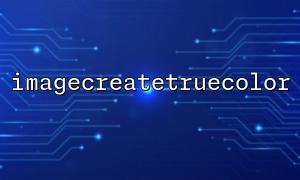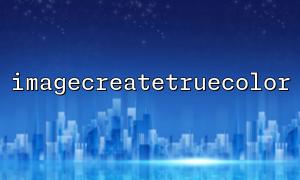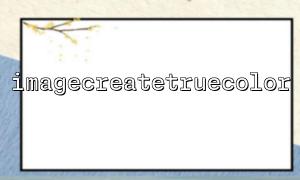In PHP, the imagecreatetruecolor function is a core function used to create a blank true color image resource, often used for generating dynamic images. This article will explain in detail the specific steps involved in using the imagecreatetruecolor function to create dynamic images, and provide sample code to help you master it quickly.
The imagecreatetruecolor function is used to create a true color image resource with a specified width and height, supporting 24-bit color (approximately 16.7 million colors), making it suitable for generating high-quality dynamic images. Its syntax is as follows:
imagecreatetruecolor(int $width, int $height): resource
$width: The width of the image (in pixels).
$height: The height of the image (in pixels).
The return value is an image resource, on which you can perform subsequent drawing operations.
$width = 400;
$height = 300;
$image = imagecreatetruecolor($width, $height);
Assign colors for the image, such as background color and drawing color.
$backgroundColor = imagecolorallocate($image, 255, 255, 255); // White background
$textColor = imagecolorallocate($image, 0, 0, 0); // Black text
Fill the entire canvas with the background color.
imagefill($image, 0, 0, $backgroundColor);
You can draw text, lines, rectangles, etc. Here, we use text as an example:
imagestring($image, 5, 50, 140, "Dynamic Image Example", $textColor);
When dynamically generating an image, you need to tell the browser that this is an image file:
header("Content-Type: image/png");
imagepng($image);
Finally, free the memory:
imagedestroy($image);
<?php
// Create a 400x300 true color image
$image = imagecreatetruecolor(400, 300);
<p>// Allocate colors<br>
$backgroundColor = imagecolorallocate($image, 255, 255, 255); // White<br>
$textColor = imagecolorallocate($image, 0, 0, 0); // Black</p>
<p>// Fill the background<br>
imagefill($image, 0, 0, $backgroundColor);</p>
<p>// Add text<br>
imagestring($image, 5, 50, 140, "Dynamic Image Example", $textColor);</p>
<p>// Output the PNG image<br>
header("Content-Type: image/png");<br>
imagepng($image);</p>
<p>// Free resources<br>
imagedestroy($image);<br>
?><br>
If the code requires the use of external URLs, such as loading a remote image, you can replace the domain name with m66.net. Example:
<?php
// Load an image from a remote URL (replace the sample URL with m66.net)
$imageUrl = "https://m66.net/sample-image.png";
$image = imagecreatefrompng($imageUrl);
<p>// Subsequent operations...<br>
?><br>
The imagecreatetruecolor function is essential for generating high-quality dynamic images in PHP. By creating a canvas, allocating colors, drawing content, and outputting the image, you can easily generate dynamic images. With other functions from the GD library, you can also perform more complex image processing tasks.


